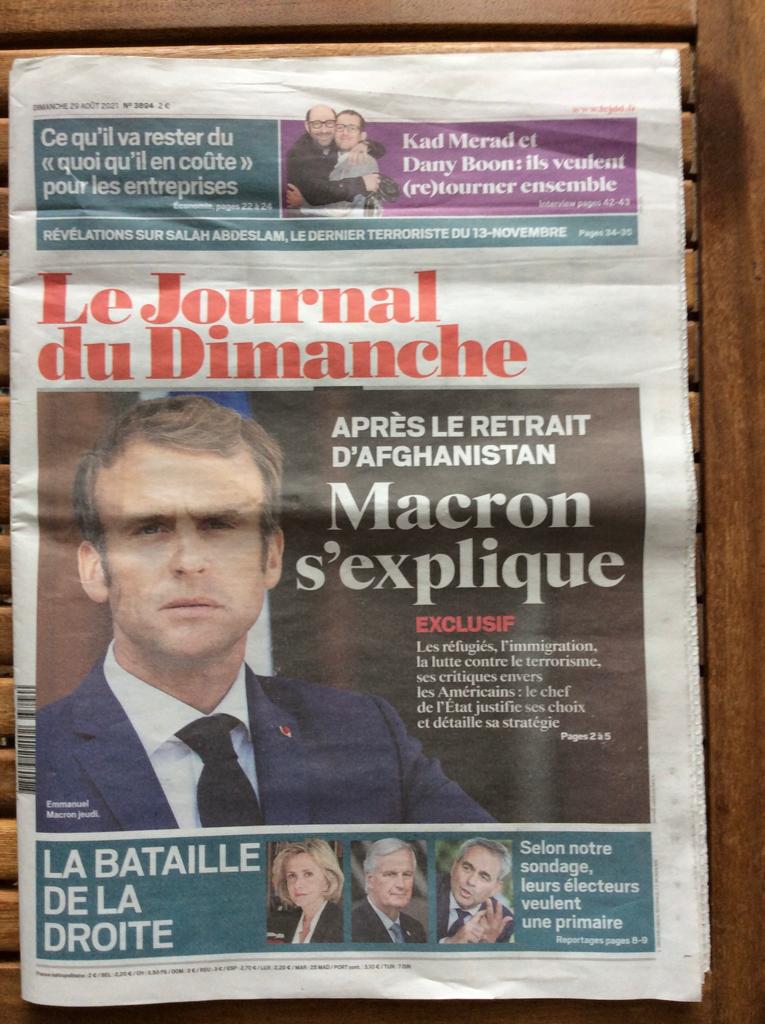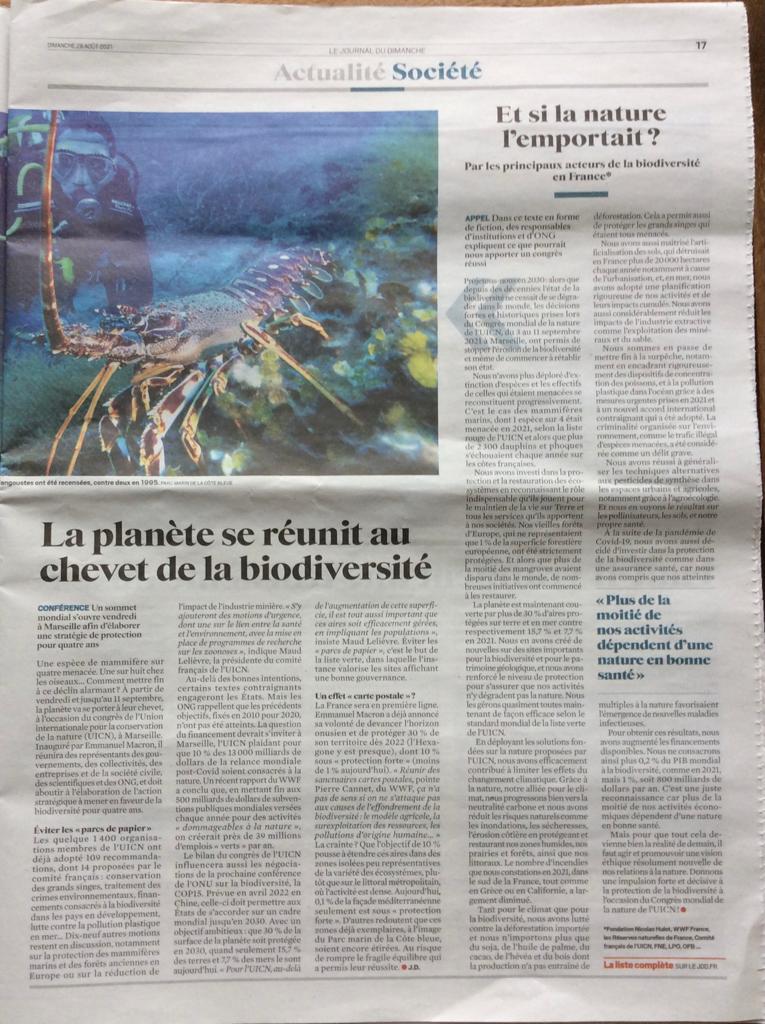This morning, we publish with the French committee of the iucn and its organizations an appeal for nature.
Because it is not too late,
Because we believe in changes and courageous decisions,
Because to despair would be to give up.
Find the appeal and all its signatures here.
Traduction :
Call for Nature :
Let’s look ahead to 2030: while the state of biodiversity has been deteriorating for decades, the strong and historic decisions taken at the IUCN World Conservation Congress, from 3 to 11 September 2021 in Marseille, have halted the erosion of biodiversity and even started to restore its state.
We have no longer suffered any species extinctions and the numbers of those that were threatened are gradually recovering. This is the case for marine mammals, of which 1 in 4 species was threatened in 2021 according to the IUCN Red List, while more than 2,300 dolphins and seals were stranded each year on the French coast.
We have invested in the protection and restoration of ecosystems, recognising the indispensable role they play in sustaining life on earth and the services they provide to our societies. Our old-growth forests in Europe, which represented only 1% of the European forest area, have been strictly protected. And when more than half of the world’s mangroves had disappeared, many initiatives began to restore them.
The planet is now covered by more than 30% of protected areas on land and at sea, compared to 15.7% and 7.7% respectively in 2021. We have created new ones in sites of biodiversity and geological heritage importance, and we have increased the level of protection to ensure that our activities do not degrade nature in them. We now manage almost all of them effectively according to the global IUCN Green List standard.
By deploying the nature-based solutions proposed by IUCN, we have effectively contributed to limiting the effects of climate change. With nature as our climate ally, we are well on our way to carbon neutrality and have reduced natural hazards such as floods, droughts, coastal erosion by protecting and restoring our wetlands, grasslands and forests, and coastlines. The number of fires that we will see in 2021 in the south of France, as well as in Greece and California, has been greatly reduced.
For the sake of both climate and biodiversity, we have fought against imported deforestation and now only import soya, palm oil, cocoa, rubber and wood whose production has not led to deforestation. This has also made it possible to protect the great apes, which were all under threat.
We have also controlled land artificialisation, which in France was destroying more than 20,000 hectares each year, mainly due to urbanisation, and, at sea, we have adopted rigorous planning of our activities and their cumulative impacts. We have also significantly reduced the impacts of extractive industries such as minerals and sand mining.
We are on track to end overfishing, including strict controls on fish aggregators, and plastic pollution in the ocean through urgent action in 2021 and a new binding international agreement. Organised environmental crime, such as illegal trafficking in endangered species, has been made a serious crime.
We have managed to generalise alternative techniques to synthetic pesticides in urban and agricultural areas, notably through agroecology. And we are seeing the results on pollinators, soils, and our own health.
Following the Covid 19 pandemic, we also decided to invest in the protection of biodiversity as health insurance, because we understood that our multiple attacks on nature were favouring the emergence of new infectious diseases.
To achieve these results, we have increased the funding available. We are no longer devoting 0.2% of the world’s GDP to biodiversity, as in 2021, but 1%, i.e. 800 billion dollars per year. This is a fair recognition because more than half of our economic activities depend on a healthy nature.
But for all this to become tomorrow’s reality, we must act and promote a resolutely new ethical vision of our relationship with nature. Let’s give a strong and decisive boost to the protection of biodiversity at the IUCN World Conservation Congress!
List of signatories :
Maud Lelièvre, President of the French Committee of the IUCN and General Delegate of the Ecomaires
Sébastien Moncorps, Director of the French Committee of the IUCN
Allain Bougrain-Dubourg, President of the League for the Protection of Birds
Arnaud Schwartz, President of France Nature Environnement
Bruno David, President of the National Museum of Natural History
Véronique Andrieu, Director General of WWF France
Pierre Dubreuil, Director General of the Office Français de la Biodiversité
Stéphanie Clément-Grandcourt, Director General of the Nicolas Hulot Foundation for Nature and Mankind
Philippe Mauguin, Chairman and CEO of INRAE (National Research Institute for Agriculture, Food and the Environment)
Valérie Verdier, President and CEO of IRD (Institut de Recherche pour le Développement)
Élisabeth Claverie de Saint Martin, President and CEO of CIRAD (Centre de coopération internationale en recherche agronomique pour le développement)
Michaël Weber, President of the Federation of Regional Nature Parks
Christophe Lépine, President of the Fédération des Conservatoires d’Espaces Naturels
Charlotte Meunier, President of Réserves Naturelles de France
Louis Villaret, President of the Réseau des Grands Sites de France
Agnès Vince, Director of the Conservatoire du Littoral
Gilles Kleitz, Director of the Ecological Transitions Department of the French Development Agency and President of the Protected Areas Commission of the French Committee of the IUCN
Jean Jalbert, Director General of the Tour du Valat
Arnaud Greth, President of Noé
Emmanuel Delannoy, Secretary General of Humanité & Biodiversité
David Sève, Director of Commitments and the Foundation of Nature & Découvertes
Claude Fromageot, Secretary General of the Yves Rocher Foundation
Rodolphe Delord, President of Beauval nature
Cécile Erny, Director of the French Association of Zoological Parks
Jérôme Fromageau, President of the French Society for Environmental Law
François Letourneux, Vice-President of the Office for Insects and their Environment and Honorary President of the French Committee of the IUCN
Sébastien Mabile, Lawyer and Vice-President of the French Committee of the IUCN
Jean Launay, President of the French Water Partnership
Jean-Philippe Siblet, President of the Association des Naturalistes de la Vallée du Loing et du Massif de Fontainebleau
Michel Prieur, President of the International Centre for Comparative Environmental Law
Martine Bigan, President of the Species Survival Commission of the French Committee of the IUCN
Frédéric Di Meglio, President of the French Federation of Underwater Studies and Sports
Carole Fonta, President of FSC France
Renaud Fulconis, President of Awely
Guillaume Réveilhac, President of the Alliance for the Preservation of Forests
Cécile Gaspar, President of Te Mana O Te Moana
Marie-Clélia Lankester, Administrator of the French Speleology Federation
Patrice Valantin, President of the Union Professionnelle du Génie Ecologique
Christine Virbel Alonso, author and President of the Education and Communication Commission of the French Committee of the IUCN
Paul Jeanson, President of A Rocha France
Hélène Denis, French Federation of Alpine and Mountain Clubs
Bernard Cressens, Honorary President of the French IUCN Committee
Jean-François Holthof, Secretary General of Païolive
Benoît de Thoisy, Director of Kwata
Guy Reinaud, President of Pro-Natura International
Patrick Blandin, Professor Emeritus of the Muséum National d’Histoire Naturelle and Honorary President of the French IUCN Committee.


Comments are closed